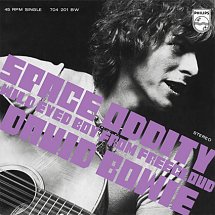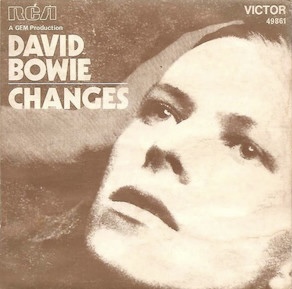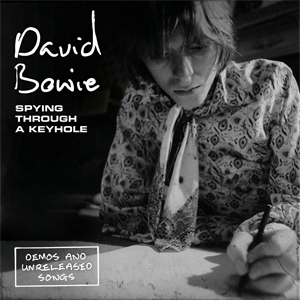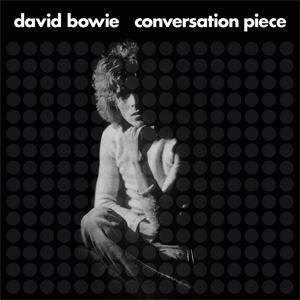
Aladdin Sane is the sixth studio album by the English musician David Bowie, released in the United Kingdom on 19 April 1973 through RCA Records. The follow-up to his breakthrough The Rise and Fall of Ziggy Stardust and the Spiders from Mars, it was the first album he wrote and released from a position of stardom. It was co-produced by Bowie and Ken Scott and features contributions from Bowie's backing band the Spiders from Mars — Mick Ronson, Trevor Bolder and Mick Woodmansey — with the pianist Mike Garson, two saxophonists and three backing vocalists. Recorded in London and New York City between legs of the Ziggy Stardust Tour, the record was Bowie's final album with the full Spiders lineup.

Hunky Dory is the fourth studio album by the English musician David Bowie, released in the United Kingdom on 17 December 1971 through RCA Records. Following a break from touring and recording, Bowie settled down to write new songs, composing on piano rather than guitar as in earlier works. Bowie assembled Mick Ronson (guitar), Trevor Bolder (bass) and Mick Woodmansey (drums), and began to record a new album in mid-1971 at Trident Studios in London. Rick Wakeman contributed piano shortly before joining Yes. Bowie co-produced the album with Ken Scott, who had engineered Bowie's previous two records.

"Space Oddity" is a song by the English singer-songwriter David Bowie. It was first released on 11 July 1969 by Philips and Mercury Records as a 7-inch single, then as the opening track of his second studio album, David Bowie. Produced by Gus Dudgeon and recorded at Trident Studios in London, it is a tale about a fictional astronaut named Major Tom; its title and subject matter were partly inspired by 2001: A Space Odyssey (1968) and Bowie's feelings of alienation at that point in his career. Its sound departed from the music hall of his debut album to psychedelic folk inspired by the Bee Gees; it was one of the most musically complex compositions he had written up to that point.

David Bowie is the second studio album by the English musician David Bowie, originally released in the United Kingdom on 14 November 1969 through Mercury affiliate Philips Records. Financed by Mercury on the strength of "Space Oddity", the album was recorded from June to October 1969 at Trident Studios in London. Gus Dudgeon produced "Space Oddity", while Tony Visconti produced the rest of the album. It featured an array of collaborators, including Herbie Flowers, Rick Wakeman, Terry Cox and the band Junior's Eyes.

"Life on Mars?" is a song by the English musician David Bowie, first released on his 1971 album Hunky Dory. Bowie wrote the song as a parody of Frank Sinatra's "My Way". "Life on Mars?" was recorded on 6 August 1971 at Trident Studios in London, and was co-produced by Bowie and Ken Scott. Bowie's backing band consisted of guitarist and string arranger Mick Ronson, bassist Trevor Bolder, drummer Mick Woodmansey and Strawbs member Rick Wakeman on piano. "Life on Mars?" is primarily a glam rock ballad, with elements of cabaret and art rock; it has a complex structure that includes chord changes throughout. The lyrics are about a girl who goes to a cinema to escape reality, and include surreal images that reflect optimism and the effects of Hollywood.

Pin Ups is the seventh studio album by the English musician David Bowie, released on 19 October 1973 through RCA Records. Devised as a "stop-gap" album to appease his record label, it is a covers album, featuring glam rock and proto-punk versions of songs by 1960s bands who were influential to Bowie as a teenager, including the Pretty Things, the Who, the Yardbirds and Pink Floyd.

"1984" is a song by the English musician David Bowie, from his 1974 album Diamond Dogs, released as a single in the United States and Japan. Written in 1973, it was inspired by George Orwell's Nineteen Eighty-Four and, like much of its parent album, originally intended for a stage musical based on the novel, which was never produced because permission was refused by Orwell's widow Sonia.

"Changes" is a song by the English musician David Bowie from his 1971 album Hunky Dory. RCA Records then released it as a single from the album on 7 January 1972. Written following his promotional tour of America in early 1971, "Changes" was recorded at Trident Studios in London between June and July that year. Co-produced by Bowie and Ken Scott, it featured Rick Wakeman on piano and the musicians who would later become known as the Spiders from Mars—Mick Ronson, Trevor Bolder and Mick Woodmansey.

"Cat People (Putting Out Fire)" is a song recorded by the English singer-songwriter David Bowie as the title track of the 1982 erotic horror film Cat People. Bowie became involved with the track after director Paul Schrader reached out to him about collaborating. The song was recorded at Mountain Studios in Montreux, Switzerland in July 1981. Bowie wrote the lyrics, which reflected the film, while the Italian producer Giorgio Moroder composed the music.

"Loving the Alien" is a song written and recorded by David Bowie. It was the opening track to his sixteenth studio album Tonight. One of two tracks on the album written solely by Bowie, an edited version of the song was released as a single in May 1985, nine months after the release of lead single "Blue Jean" and eight months after the release of the album. "Loving the Alien" peaked at No. 19 in the UK Singles Chart. "Loving the Alien" inspired the title of Christopher Sandford's 1997 biography of Bowie and the 2018 Bowie box set release, Loving the Alien (1983–1988).
"Cygnet Committee" is a song written by the English singer-songwriter David Bowie and recorded in 1969 for his second eponymous album. At over 9 minutes this ambitious progressive folk rock song was Bowie's longest studio recording until the opening/title track of 1976's Station to Station.
"Black Country Rock" is a song by the English musician David Bowie, released on his 1970 album The Man Who Sold the World. The song was recorded in May 1970, with sessions taking place at Trident and Advision Studios in London. The lineup featured Bowie on lead vocals, guitarist Mick Ronson, bassist/producer Tony Visconti, drummer Mick Woodmansey and Ralph Mace on Moog synthesiser. The track was mostly composed by Ronson and Visconti, who developed it using a basic song sketch from Bowie. Labelled under the working title "Black Country Rock", Bowie used the title to write the lyrics towards the end of the sessions, resulting in a repeated two-line verse and chorus. A blues rock and hard rock number, Bowie imitates T. Rex's Marc Bolan in his vocal performance.
"Oh! You Pretty Things" is a song by the English singer-songwriter David Bowie from his 1971 album Hunky Dory. It was the first song he wrote for the album. Bowie recorded the song as a demo before giving it to singer Peter Noone, lead singer of Herman's Hermits, who decided to release it as his debut solo single. Featuring Bowie on piano, Noone's recording was produced by Mickie Most and featured structural and lyrical differences from Bowie's later version. Released by RAK Records in April 1971 under the title "Oh You Pretty Thing", the single peaked at number 12 in the UK, becoming Bowie's biggest success as a songwriter since his own single "Space Oddity" two years earlier.
"Five Years" is a song by the English musician David Bowie, released on his 1972 album The Rise and Fall of Ziggy Stardust and the Spiders from Mars. Co-produced by Bowie and Ken Scott, it was recorded in November 1971 at Trident Studios in London with his backing band the Spiders from Mars − comprising Mick Ronson, Trevor Bolder and Mick Woodmansey. As the opening track on the album, the song introduces the overarching theme of the album: an impending apocalyptic disaster will destroy Earth in five years and the being who will save it is a bisexual alien rock star named Ziggy Stardust. While the first two verses are told from a child narrator's perspective, the third is from Bowie's, who addresses the listener directly. As the track progresses, it builds intensity, before climaxing with strings and Bowie screaming the title.

"Ziggy Stardust" is a song by the English singer-songwriter David Bowie from his 1972 album The Rise and Fall of Ziggy Stardust and the Spiders from Mars. Co-produced by Bowie and Ken Scott, he recorded it at Trident Studios in London in November 1971 with his backing band the Spiders from Mars—comprising Mick Ronson, Trevor Bolder and Mick Woodmansey. Lyrically, the song is about Ziggy Stardust, a bisexual alien rock star who acts as a messenger for extraterrestrial beings. The character was influenced by English singer Vince Taylor, as well as the Legendary Stardust Cowboy and Kansai Yamamoto. Although Ziggy is introduced earlier on the album, this song is its centrepiece, presenting the rise and fall of the star in a very human-like manner. Musically, it is a glam rock song, like its parent album, and is based around a Ronson guitar riff.

Sound + Vision is the first box set by English musician David Bowie, released by Rykodisc in 1989. By the end of the 1980s, the rights to Bowie's pre-1983 catalogue reverted to Bowie and his former management company, MainMan. Rykodisc had approached Bowie in 1988 to re-release his albums on CD and Bowie agreed, and in September 1989 the Sound + Vision box set was released. By April 1990, the box set had sold over 200,000 copies, which, for a set costing $50–$60, was considered "phenomenal".

Spying Through a Keyhole is a box set by English musician David Bowie, released in April 2019. The set includes four 7" vinyl records containing nine songs written and performed by Bowie during 1968, the era in which he was writing for his album David Bowie (1969). All songs in the collection are presented in mono, demo form.

The 'Mercury' Demos is a box set by English musician David Bowie, released as a vinyl album in May 2019. It features ten songs in mono, demo form performed by Bowie with his friend John Hutchinson in early 1969. In November 2019, the compilation was released on CD as part of the Conversation Piece box set.

Conversation Piece is a box set by English musician David Bowie, released in November 2019, which contains five CDs featuring recordings made in 1968–1969. The box set includes home demos and BBC sessions, as well as two mixes of the 1969 album Space Oddity: the original 1969 stereo mix, and a new 2019 mix produced by Tony Visconti specifically for the set. The release of the 1969 mix is a repressing of the 2009 remastered CD, which was chosen due to its being mastered to match the original LP release, a priority that was not taken for Parlophone's in-house remaster created for the Five Years (1969–1973) box set in 2015.















